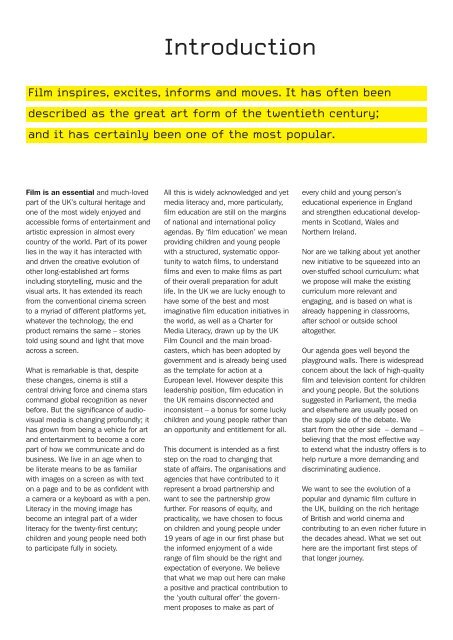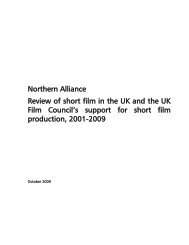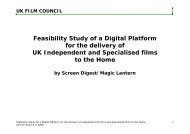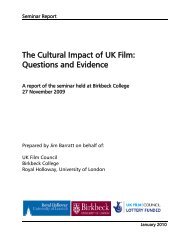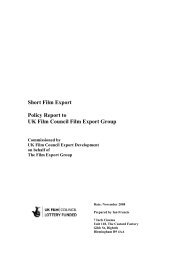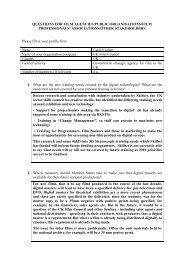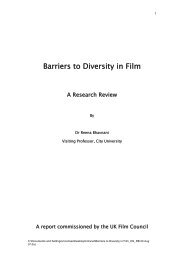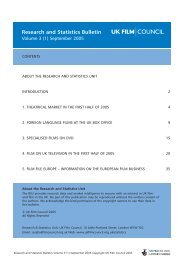FILM: 21ST CENTURY LITERACY - BFI
FILM: 21ST CENTURY LITERACY - BFI
FILM: 21ST CENTURY LITERACY - BFI
Create successful ePaper yourself
Turn your PDF publications into a flip-book with our unique Google optimized e-Paper software.
Film is an essential and much-loved<br />
part of the UK’s cultural heritage and<br />
one of the most widely enjoyed and<br />
accessible forms of entertainment and<br />
artistic expression in almost every<br />
country of the world. Part of its power<br />
lies in the way it has interacted with<br />
and driven the creative evolution of<br />
other long-established art forms<br />
including storytelling, music and the<br />
visual arts. It has extended its reach<br />
from the conventional cinema screen<br />
to a myriad of different platforms yet,<br />
whatever the technology, the end<br />
product remains the same – stories<br />
told using sound and light that move<br />
across a screen.<br />
What is remarkable is that, despite<br />
these changes, cinema is still a<br />
central driving force and cinema stars<br />
command global recognition as never<br />
before. But the significance of audiovisual<br />
media is changing profoundly; it<br />
has grown from being a vehicle for art<br />
and entertainment to become a core<br />
part of how we communicate and do<br />
business. We live in an age when to<br />
be literate means to be as familiar<br />
with images on a screen as with text<br />
on a page and to be as confident with<br />
a camera or a keyboard as with a pen.<br />
Literacy in the moving image has<br />
become an integral part of a wider<br />
literacy for the twenty-first century;<br />
children and young people need both<br />
to participate fully in society.<br />
Introduction<br />
Film inspires, excites, informs and moves. It has often been<br />
described as the great art form of the twentieth century;<br />
and it has certainly been one of the most popular.<br />
All this is widely acknowledged and yet<br />
media literacy and, more particularly,<br />
film education are still on the margins<br />
of national and international policy<br />
agendas. By ‘film education’ we mean<br />
providing children and young people<br />
with a structured, systematic opportunity<br />
to watch films, to understand<br />
films and even to make films as part<br />
of their overall preparation for adult<br />
life. In the UK we are lucky enough to<br />
have some of the best and most<br />
imaginative film education initiatives in<br />
the world, as well as a Charter for<br />
Media Literacy, drawn up by the UK<br />
Film Council and the main broadcasters,<br />
which has been adopted by<br />
government and is already being used<br />
as the template for action at a<br />
European level. However despite this<br />
leadership position, film education in<br />
the UK remains disconnected and<br />
inconsistent – a bonus for some lucky<br />
children and young people rather than<br />
an opportunity and entitlement for all.<br />
This document is intended as a first<br />
step on the road to changing that<br />
state of affairs. The organisations and<br />
agencies that have contributed to it<br />
represent a broad partnership and<br />
want to see the partnership grow<br />
further. For reasons of equity, and<br />
practicality, we have chosen to focus<br />
on children and young people under<br />
19 years of age in our first phase but<br />
the informed enjoyment of a wide<br />
range of film should be the right and<br />
expectation of everyone. We believe<br />
that what we map out here can make<br />
a positive and practical contribution to<br />
the ‘youth cultural offer’ the government<br />
proposes to make as part of<br />
every child and young person’s<br />
educational experience in England<br />
and strengthen educational developments<br />
in Scotland, Wales and<br />
Northern Ireland.<br />
Nor are we talking about yet another<br />
new initiative to be squeezed into an<br />
over-stuffed school curriculum: what<br />
we propose will make the existing<br />
curriculum more relevant and<br />
engaging, and is based on what is<br />
already happening in classrooms,<br />
after school or outside school<br />
altogether.<br />
Our agenda goes well beyond the<br />
playground walls. There is widespread<br />
concern about the lack of high-quality<br />
film and television content for children<br />
and young people. But the solutions<br />
suggested in Parliament, the media<br />
and elsewhere are usually posed on<br />
the supply side of the debate. We<br />
start from the other side – demand –<br />
believing that the most effective way<br />
to extend what the industry offers is to<br />
help nurture a more demanding and<br />
discriminating audience.<br />
We want to see the evolution of a<br />
popular and dynamic film culture in<br />
the UK, building on the rich heritage<br />
of British and world cinema and<br />
contributing to an even richer future in<br />
the decades ahead. What we set out<br />
here are the important first steps of<br />
that longer journey.


